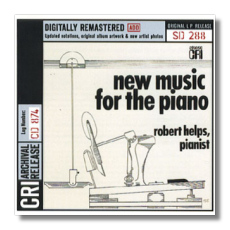
The Internet's Premier Classical Music Source
Related Links
- Latest Reviews
- More Reviews
-
By Composer
-
Collections
DVD & Blu-ray
Books
Concert Reviews
Articles/Interviews
Software
Audio
Search Amazon
Recommended Links
Site News
 CD Review
CD Review
New Music For The Piano

Short piano works by
- Kent Kennan: 2 Preludes
- Miriam Gideon: Suite for Piano #3
- Milton Babbitt: Partitions
- Ernst Bacon: Pigtown Fling
- George Perle: 6 Preludes
- Alan Hovhaness: Allegro on a Pakistan Lute Tune, Op. 104 #6
- Peggy Glanville-Hicks: Prelude for a Pensive Pupil
- Robert Helps: Image
- Ingolf Dahl: Fanfares
- Samuel Adler: Capriccio
- Hall Overton: Polarities #1
- Sol Berkowitz: Syncopations
- Ben Weber: Humoreske for Piano, Op. 49
- Paul A. Pisk: Nocturnal Interlude
- Mel Powell: Etude
- Morton Gould: Rag-Blues-Rag
- Norman Cazden: New Sonata, Op. 53 #3
- Joseph Prostakoff: 2 Bagatelles
- Mark Brunswick: 6 Bagatelles
- Earl Kim: 2 Bagatelles
- Josef Alexander: Incantation
Robert Helps, piano
CRI CD874 ADD 67:53
In 1966, RCA Victor, with the assistance of the Abby Whiteside Foundation, released an LP called New Music for the Piano. (Whiteside was a progressive and influential piano pedagogue who taught several of the composers here, including Robert Helps himself.) The record, like the published anthology of the same name that preceded it, brought together the work of American composers deemed worthy of intellectual appreciation in an era when a celebrity mentality – derived from pop music – was heavily infiltrating the classical music world. For decades, critics and musicologists had struggled to define "American music." New Music for the Piano demonstrated that American composers were becoming more diverse, not less, and that their work would not readily submit to narrow categorizations.
CRI reissued the LP in 1971. Now, the LP finally has been reissued on CD in the label's new "CRI Archives" series. The series is a response to many received requests for the restoration of out-of-print or otherwise elusive material considered to be of significant musical value. Original LP artwork and imagery has been combined with digitally remastered sound and updated liner notes.
The inclusion of twenty-one selections over the course of not quite 68 minutes creates a pleasantly bewildering array of impressions. You can listen to this CD from beginning to end and be overwhelmed by its concentration of intelligence and variety. Or, if you prefer, you can dip into it, sampling a work here and a work there, and perhaps really getting into the core of each composition. One fascinating thing about this collection is that it documents music that already seems to be from another era. Classical music in America has changed a lot since 1966 (the compositions on New Music for the Piano were composed between 1946 and 1964). The Second Viennese School – Schoenberg, Berg, and Webern – no longer influences American composers as it did in 1950. New trends and developments have put much of the music on this CD firmly in a drawer marked, for better or worse, "the past." That doesn't mean that the past isn't worth remembering and honoring. After all, that's what classical music, on the whole, is all about. It is touching and slightly ironic, though, that New Music for the Piano, while still relevant, is no longer new.
Robert Helps is a fabulous musician. In each work, he jumps right in and gets to the heart of the matter. This is challenging music, particularly because its technical demands seldom result in a merely showy payoff. He captures the listener's attention without resorting to tricks of ego. Also, it is to Helps's credit that he readily adapts to the variety of the tasks at hand.
While not repellant, the piano sound is indifferent and dated. Not being familiar with the LPs, I can't say how much the remastering has improved it. A mistake that easily could have been corrected, however, was the very short pauses – just a few seconds – between works. More breathing room would have created a big improvement.
Despite my few reservations, this is an important reissue.
Copyright © 2001, Raymond Tuttle


















